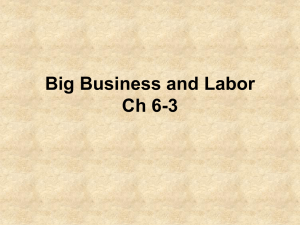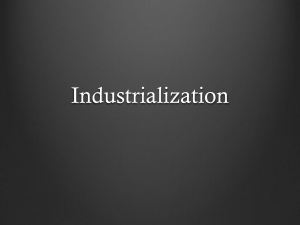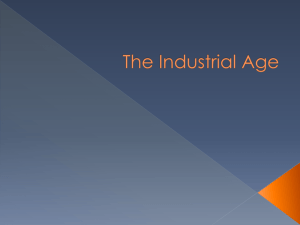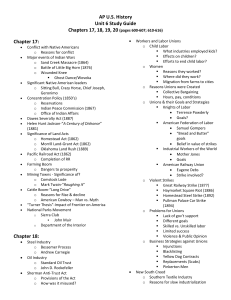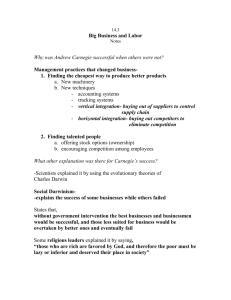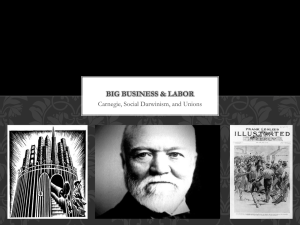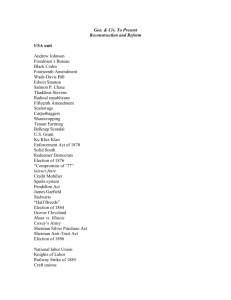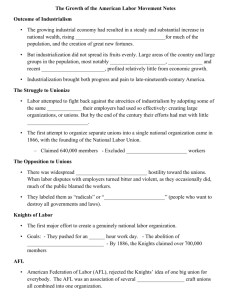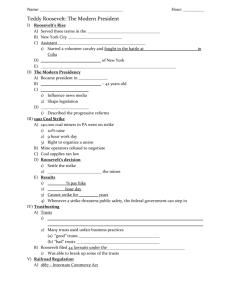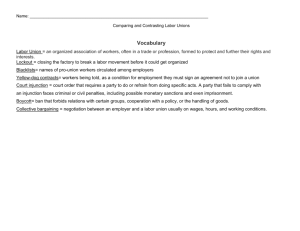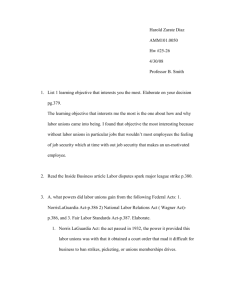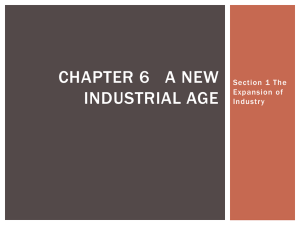Business and Labor PPT
advertisement
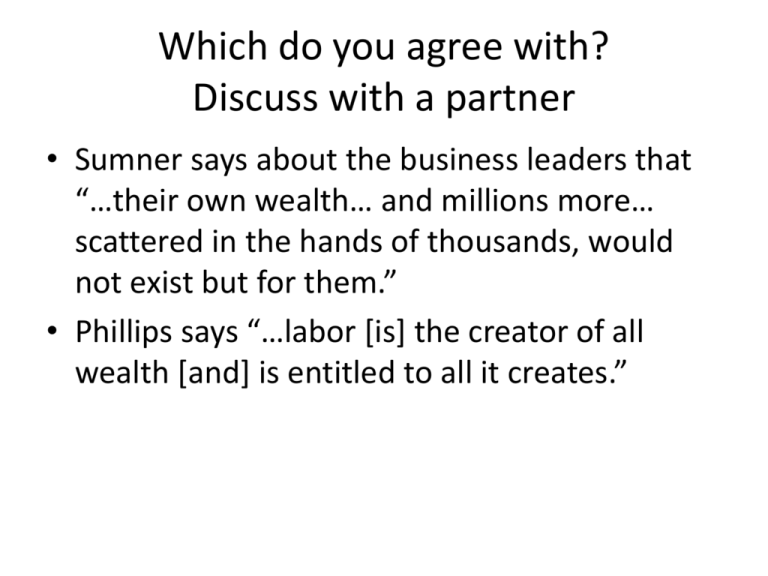
Which do you agree with? Discuss with a partner • Sumner says about the business leaders that “…their own wealth… and millions more… scattered in the hands of thousands, would not exist but for them.” • Phillips says “…labor [is] the creator of all wealth [and] is entitled to all it creates.” Business and Labor Era of Big Business • Industrial Revolution – Mechanization and innovation make large-scale production possible – Factory system introduced • Machines perform much of the specialized tasks • Workers don’t need as much skill • Assembly line – Owners have all the power Government at the time • Laissez-faire – Means “let people do” - hands off” – Government should not be involved in business • No oversight, regulation, laws • Individuals working toward their own best interest will contribute most beneficially to society Weak President, Strong Congress • overshadowed by Congress… good politicians, but uninspiring leaders – generally accepted the role of the legislative branch – even if he wanted to lead it would have been difficult: • small executive staff • none had their party in control of both houses of Congress between 1865 and 1897 • too much corruption at all levels… even the cabinet • Congress was very susceptible to bribery and influence (lots of money floating around, and they were happy to take it) A common attitude Law? What do I care about the law? Haven’t I got the power? -Cornelius Vanderbilt The Trust System • A consortium of independent organizations formed to limit competition by controlling the production and distribution of a product or service Bosses of the Senate (1889) Robber Barons or Captains of Industry? • • • • John D. Rockefeller – Standard Oil Andrew Carnegie – Carnegie Steel Henry Frick – Steel Cornelius Vanderbilt – New York Central Railroad • J.P. Morgan – Financier / US Steel Modern Colossus of (Rail) Roads 1879 A Potential Silver Lining • Though amassing their fortunes at the expense of their workers, a few of the robber barons, most notably Andrew Carnegie, practically invented the idea of philanthropy. • Carnegie endowments built libraries, research centers, a university, and many other functions of the public good. Rise of the Labor Union • Knights of Labor (1869) – First major labor organization – Eight hour day, end to child labor were major focus • American Federation of Labor (1886) – Organized into trade unions (local unions based upon skill) – Trade unions of same skill would make up a larger national union of all those who worked in the same trade – AFL would be the umbrella organization for all trade unions Sherman Anti-Trust Act • 1890 – meant to prevent trusts and monopolies – Full of loopholes – Was actually used against labor • “restraint of trade” 1892 – Homestead Strike • Workers went on strike to protest wages • Management hired scabs to keep factory running – Also hired Pinkertons (private army/police) • 9 strikers killed – Major setback for unions, especially in steel 1899 – Newsies Strike • Newspaper boys in New York organize against cost increase • Small-scale, but representative of larger movements http://www.youtube.c om/watch?v=ToScPiaR sAE Square Deal • 1901 – Theodore Roosevelt becomes president when McKinley is shot • Implements series of domestic policies known as the “Square Deal” – 3 Cs • Corporations • Consumers • Conservation Square Deal • "When I say I believe in a square deal I do not mean . . . to give every man the best hand. If the cards do not come to any man, or if they do come, and he has not got the power to play them, that is his affair. All I mean is that there shall be no crookedness in the dealing." (1905) First C - Corporations • Roosevelt attempted to break up trusts and monopolies – “Trust busting” – However, he doesn’t think all trusts are bad • Some make products affordable and efficient for consumers – 1903 (Elkins Act) and 1906 (Hepburn Act) passed laws to limit power of railroads and regulate prices National Women’s Trade Union League • Supported working-class women, reformers, and upper-class women – United by the bonds of womanhood • Provided support to women who went on strike or organized labor unions • Jane Addams was elected VP Muckrakers (1906) • Upton Sinclair – Exposed the horrors of the meatpacking industry in Chicago in his book The Jungle • Lewis Hine – Exposed child labor practices through photography Muckrakers “Men with the muckrake are often indispensable to the well-being of society…” Theodore Roosevelt, 1906 Second C - Consumers • 1906 – Passage of the Pure Food and Drug Act • outlawed food and drugs containing harmful ingredients, and required that containers carry honest ingredient labels. – Passage of the Meat Inspection Act • required federal government inspection of meat shipped across state lines. Third C - Conservation • Resources are limited, so conservation is imperative • Roosevelt disagreed with John Muir, a staunch preservationist – Muir believed all land should be protected – Roosevelt believed some should be protected, while other should be developed for the common good • Things like dams, canals, irrigation, mining, etc. Describe what you see. What can an historian learn from this picture? Triangle Shirtwaist Factory Fire Reform in the wake of tragedy • In June 1911, the New York state legislature established the Factory Investigating Commission, or FIC, to look into the safety of workplaces across the state. In 1912, the legislature passed eight labor bills recommended by the FIC that addressed sanitation, rest periods, child labor, work hours for women and children, and injuries sustained on the job. The legislature eventually passed 25 more bills recommended by the FIC. Clayton Anti-Trust Act (1914) • intended to supplement and strengthen enforcement of antitrust laws. • added new forms of prohibited conduct, such as “mergers and acquisitions where the effect may substantially lessen competition” • also gave state attorneys general the ability to enforce the federal antitrust laws 1919 – A Year of Tumult • Seattle General Strike – 65,000 workers in several unions • Boston Police Strike – First strike by public safety workers • Great Steel Strike – 350,000 workers in Illinois, Indiana, Pennsylvania, Ohio, and West Virginia – Lasted 5 months
